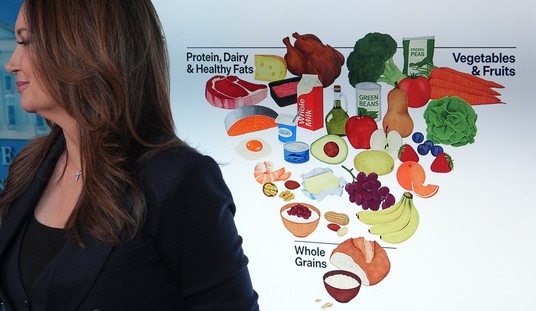Business Insider catches this delightful moment from today’s Morning Joe, in which Joe Scarborough and Mika Brzezinski chuckle over the Republican infatuation with Herman Cain and the 9-9-9 plan. It takes a while for Joe to get to brass tacks, but he finally unloads on Cain, calling him “an absolute joke” and telling viewers that he likes Santa Claus, too, but … come on. It takes Mark Halperin to inject some actual insight into why Cain and his message has resonated, even if he seems an unlikely candidate “strolling” for election rather than running:
Visit msnbc.com for breaking news, world news, and news about the economy
JOE SCARBOROUGH: A lot of people are saying they like that guy [Herman Cain]. I like Santa Claus. Herman Cain and this 999 thing is just an absolute joke. I said that about Michele Bachmann and people got upset. He is strolling for president. You look at the amount of time logged, the hours logged in the early primary states… he’s just not there. He was in Tennessee the other night. He was on a book tour. While he is on a book tour he’s saying things like he is going to put up electric fences that kill illegal immigrants and when he gets called on, he says, oh, that’s a joke. Some kind of joke.
MARK HALPERIN: He’s running in an unconventional way. The way to look at Herman Cain now is less a likely nominee and more the way to look at Occupy Wall Street which is, something’s happening in this country right now and people are reacting to it all across the political spectrum in ways that are elevating Herman Cain and elevating these protesters. He’s tapping into people’s desire to have somebody outside Washington at the center of the Republican Party.
After Halperin corrects Scarborough by pointing out the obvious — that anti-establishment feeling is riding high in the grassroots of both sides of the ideological divide — Scarborough then makes a more cogent and challenging observation:
JS: And it doesn’t really matter whether they know how Washington runs or not. You think the Republicans who have been saying for years that Barack Obama was ill-equipped to be President of the United States — which he was — would not then run to Sarah Palin, and Michele Bachmann, and Herman Cain, and a group of candidates who are ill-equipped to run Washington and this country.
That’s a fair point with Bachmann and with Cain, not so much with Palin or the rest of the field. Bachmann has never held an executive position in government, and Cain has never won an election, although he did serve as a Fed chair in Kansas City for a couple of years. Cain has a long resumé as an executive in the private sector, though, while Obama didn’t have any executive experience at all and nearly no national legislative experience when he began his presidential bid. Palin had two-plus years as a governor, Romney four, Huntsman more, and Perry eleven years — and Presidents who come to Washington with gubernatorial rather than Senate experience tend to do better in office. The three Presidents elected to the White House from the Senate in the past century are pretty good indicators of the pitfalls — Warren Harding, John Kennedy, and Obama. Of the three, only Kennedy showed any hint of improvement in his presidency; the other two have been disasters.
We’ve never elected anyone to the Presidency from the private sector, or at least not in a very long time. It might be hard to balance the critique of Obama against support for someone without electoral political office experience, but at least we would have a candidate with a track record as a successful executive — and that’s something Obama can’t claim now.
Speaking of 9-9-9, Herman Cain has offered a nine-point defense of his plan from his syndicated perch at Northstar Writers, pushing back against the critiques from both right and left:
Claim 1: The 9 percent sales tax, which is one third of the formula, is regressive and hurts the poor, many of whom pay no federal income taxes now. Response: This claim ignores some important aspects of the plan. One is that we eliminate the 15 percent payroll tax, which allows for no deductions at all – not even for charitable contributions. Some critics have argued that the poor still come out behind because employers pay much of the payroll tax. That demonstrates a basic misunderstanding about how compensation works in the business world. An employer decides to accept a certain cost-of-employment for each employee, and the employer’s share of the payroll tax is part of that cost. It comes out of your compensation whether you realize it or not. Also, a flat tax is not – by definition – a regressive tax. Everyone pays the same rate. And it is not an added tax, but a replacement tax, whose total burden is determined by the consumer’s spending decisions.
Finally, the best way to help the poor is by spurring economic growth, which the current tax code will never do, and which the 9-9-9 plan is specifically designed to do.
Claim 2: Creating a new tax is merely setting the stage for higher rates on all taxes, as untrustworthy politicians will surely raise them. Response: First of all, that is not a criticism of the 9-9-9 plan. It is a criticism of politicians. If you don’t want the rates raised, don’t elect politicians who will raise them. Even if we repealed the 16thAmendment and eliminated the income tax, as some demand in return for establishing a consumption tax, politicians could raise that rate too. What’s far more important here is the fact that the very simple, flat-rate structure of the 9-9-9 plan, which allows no deductions, loopholes or exemptions (with the exception of charitable contributions for the income tax), is a far more growth-friendly tax structure than the mangled mess of rates, taxes, exemptions and ill-conceived incentives we have today. It virtually eliminates the massive compliance costs of the current tax code, and it restrains the size of government.
By taking away the politicians’ gateway drug of loopholes and deductions, we make it much more difficult for them to mess with the tax code. Having said that, any plan could be criticized for what it would look like if someone messed it up. The plan as I’m proposing it is a huge improvement over the status quo.
Claim 3: The plan redistributes wealth from the poor to the rich.Response: It does no such thing. It is fair and neutral, taxing everything once and nothing twice. What’s more, we are getting ready to propose empowerment zones for economically struggling areas in which the rates will be even lower. That will allow the poor to benefit even more from the plan than they already would.
Be sure to read it all.









Join the conversation as a VIP Member